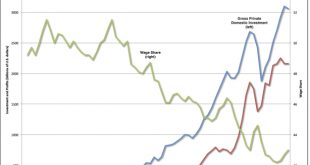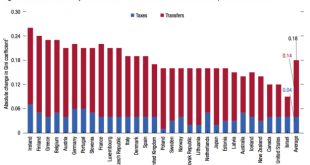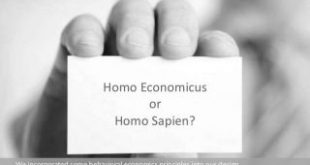from David Ruccio Kevin Hassett and the other members of the president’s Council of Economic Advisers are just like the long-haired preachers Joe Hill sang about more than a century ago. They come out every night to tell us what’s wrong and what’s right. But when asked about something to eat, they answer in voices so sweet: You will eat, bye and bye In that glorious land above the sky Work and pray, live on hay You’ll get pie in the sky when you die. That’s a lie With one notable...
Read More »Axioms — things to be suspicious of
from Lars Syll To me, the crucial difference between modelling in physics and in economics lies in how the fields treat the relative role of concepts, equations and empirical data … An economist once told me, to my bewilderment: “These concepts are so strong that they supersede any empirical observation” … Physicists, on the other hand, have learned to be suspicious of axioms. If empirical observation is incompatible with a model, the model must be trashed or amended, even if it is...
Read More »The Republican tax plan to slow growth
from Dean Baker In the speech where President Reagan launched his push for the last major tax reform in 1986, he criticized a tax code that “treats people’s earnings, similar incomes, much differently regarding the tax that they pay; and… causes some to invest their money, not to make a better mousetrap but simply to avoid a tax trap.” He was right to make these criticisms. Unfortunately the current Republican plan goes in the opposite direction in two important areas: the treatment of...
Read More »Tackle this!
from David Ruccio The latest IMF Fiscal Monitor, “Tackling Inequality,” is out and it represents a direct challenge to the United States. It’s not just a rebuke to Donald Trump, who with his allies is pursuing under the guise of “tax reform” a set of policies that will lead to even greater inequality—or, for that matter, Republicans in state governments across the country that have sought to cut back on programs targeted at poor Americans. It also takes to task decades of growing...
Read More »AM02: Supply & Demand
from Asad Zaman 2nd Lecture (90min) on Advanced Microeconomics at PIDE, (14 Sep 2017). While planning to teach a heterodox micro course, I was faced with the dilemma of choosing a suitable textbook. Interestingly, there are many options available, but I was not happy with most of them. Some were too mathematical for my taste, some made too many concessions to conventional micro while being critical of it, and some were simply not suitable for use as texts. Eventually, I decided to use Rod...
Read More »Thaler and behavioural economics — some critical perspectives
from Lars Syll Although discounting empirical evidence cannot be the right way to solve economic issues, there are still, in my opinion, a couple of weighty reasons why we perhaps shouldn’t be too excited about the so-called ’empirical revolution’ in economics. Behavioural experiments and laboratory research face the same basic problem as theoretical models — they are built on often rather artificial conditions and have difficulties with the ‘trade-off’ between internal and external...
Read More »The New Paradigm that emerged in economic s after WWII
from Robert Locke As an historian, I am somewhat appalled at the inability of economists, including those on this blog to get the history of their own discipline straight. The obsession has been with neoclassical economic’s attempt to turn economics into a physico-mathematical discipline as Walras phrased it, and the economists usually discuss this attempt within the historical context of their discipline pre-1945, with references, to Walras, Marshall, Keynes, and others. It became...
Read More »The International Monetary Fund’s world economic outlook in theory and practice
from Mark Weisbrot The International Monetary Fund (IMF) released its biannual “World Economic Outlook” (WEO) today, presenting a 300-page overview of the world economy and where it might be going. The Fund is one of the most powerful and influential financial institutions in the world. Despite the fact that this flagship publication, and the Fund’s hundreds of PhD economists, missed the two biggest asset bubbles in US and world history (the stock market bubble in the late 1990s and the...
Read More »Keynes — the first behavioural economist
from Lars Syll To-day, in many parts of the world, it is the serious embarrassment of the banks which is the cause of our gravest concern … [The banks] stand between the real borrower and the real lender. They have given their guarantee to the real lender; and this guarantee is only good if the money value of the asset belonging to the real borrower is worth the money which has been advanced on it. It is for this reason that a decline in money values so severe as that which we are now...
Read More »Kevin Warsh as Fed Chair: The art of marrying rich and falling upward
from Dean Baker Since the dawn of time men have married into prominent families as a way to improve their career prospects, but as Jared Kushner can attest, the returns to marrying well have never been greater. We may see further proof of this proposition if Donald Trump selects Kevin Warsh to replace Janet Yellen as chair of the Federal Reserve Board. Like Kushner, Warsh’s secret to success seems to rest largely on the family he married into. Warsh’s father-in-law is the billionaire...
Read More » Real-World Economics Review
Real-World Economics Review





